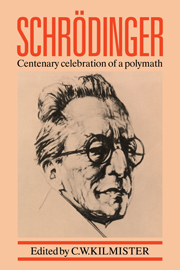Book contents
- Frontmatter
- Contents
- List of contributors
- Preface
- 1 Introduction
- 2 Boltzmann's influence on Schrödinger
- 3 Schrödinger's original interpretation of the Schrödinger equation: a rescue attempt
- 4 Are there quantum jumps?
- 5 Square root of minus one, complex phases and Erwin Schrödinger
- 6 Consequences of the Schrödinger equation for atomic and molecular physics
- 7 Molecular dynamics: from H+H2 to biomolecules
- 8 Orbital presentation of chemical reactions
- 9 Quantum chemistry
- 10 Eamon de Valera, Erwin Schrödinger and the Dublin Institute
- 11 Do bosons condense?
- 12 Schrödinger's nonlinear optics
- 13 Schrödinger's unified field theory seen 40 years later
- 14 The Schrödinger equation of the Universe
- 15 Overview of particle physics
- 16 Gauge fields, topological defects and cosmology
- 17 Quantum theory and astronomy
- 18 Schrödinger's contributions to chemistry and biology
- 19 Erwin Schrödinger's What is Life? and molecular biology
- Index
10 - Eamon de Valera, Erwin Schrödinger and the Dublin Institute
Published online by Cambridge University Press: 19 January 2010
- Frontmatter
- Contents
- List of contributors
- Preface
- 1 Introduction
- 2 Boltzmann's influence on Schrödinger
- 3 Schrödinger's original interpretation of the Schrödinger equation: a rescue attempt
- 4 Are there quantum jumps?
- 5 Square root of minus one, complex phases and Erwin Schrödinger
- 6 Consequences of the Schrödinger equation for atomic and molecular physics
- 7 Molecular dynamics: from H+H2 to biomolecules
- 8 Orbital presentation of chemical reactions
- 9 Quantum chemistry
- 10 Eamon de Valera, Erwin Schrödinger and the Dublin Institute
- 11 Do bosons condense?
- 12 Schrödinger's nonlinear optics
- 13 Schrödinger's unified field theory seen 40 years later
- 14 The Schrödinger equation of the Universe
- 15 Overview of particle physics
- 16 Gauge fields, topological defects and cosmology
- 17 Quantum theory and astronomy
- 18 Schrödinger's contributions to chemistry and biology
- 19 Erwin Schrödinger's What is Life? and molecular biology
- Index
Summary
Introduction
Two of the great men of our times are remembered here. Each possessed a wondrous range of endowments. They were men of courageous vision. The fruits of their endeavour and their vision have much significance in diverse ways for ourselves and our successors. Both were obviously of extraordinary independence of mind and given to much solitary work, yet both owed a great deal to their living among contemporaries who were themselves of outstanding distinction and dedication to their ideals.
Eamon de Valera, statesman and leader, visionary, natural scholar and devotee of mathematics, was born in New York in 1882 of somewhat obscure parentage of Spanish and Irish descent. A British court sentenced him to death for his part in the Irish uprising of 1916, although this was later commuted. In 1921 he became Chancellor of the National University of Ireland; in 1932 he was made head of the government of the Irish Free State and the President of the Council of the League of Nations; and in 1938 he became President of the Assembly of that body. In 1940 he established the Dublin Institute for Advanced Studies with its Schools of Celtic Studies, Theoretical Physics and, in 1947, its School of Cosmic Physics. He was President of the Republic of Ireland between 1959 and 1973. The Royal Society of London elected him a Fellow in 1968. He died in 1975, aged nearly 93.
- Type
- Chapter
- Information
- SchrödingerCentenary Celebration of a Polymath, pp. 119 - 135Publisher: Cambridge University PressPrint publication year: 1987
- 1
- Cited by



